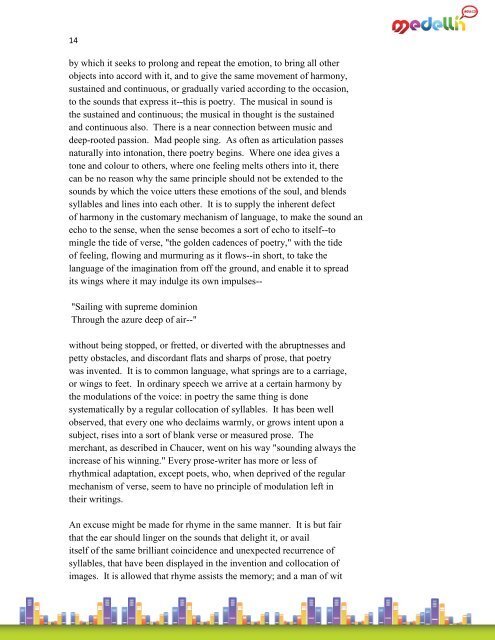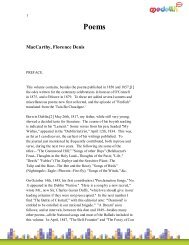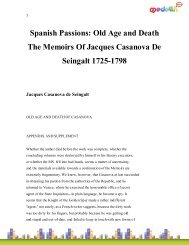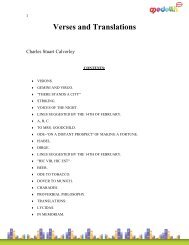Lectures On The English Poets William Hazlitt
Lectures On The English Poets William Hazlitt
Lectures On The English Poets William Hazlitt
You also want an ePaper? Increase the reach of your titles
YUMPU automatically turns print PDFs into web optimized ePapers that Google loves.
14<br />
by which it seeks to prolong and repeat the emotion, to bring all other<br />
objects into accord with it, and to give the same movement of harmony,<br />
sustained and continuous, or gradually varied according to the occasion,<br />
to the sounds that express it--this is poetry. <strong>The</strong> musical in sound is<br />
the sustained and continuous; the musical in thought is the sustained<br />
and continuous also. <strong>The</strong>re is a near connection between music and<br />
deep-rooted passion. Mad people sing. As often as articulation passes<br />
naturally into intonation, there poetry begins. Where one idea gives a<br />
tone and colour to others, where one feeling melts others into it, there<br />
can be no reason why the same principle should not be extended to the<br />
sounds by which the voice utters these emotions of the soul, and blends<br />
syllables and lines into each other. It is to supply the inherent defect<br />
of harmony in the customary mechanism of language, to make the sound an<br />
echo to the sense, when the sense becomes a sort of echo to itself--to<br />
mingle the tide of verse, "the golden cadences of poetry," with the tide<br />
of feeling, flowing and murmuring as it flows--in short, to take the<br />
language of the imagination from off the ground, and enable it to spread<br />
its wings where it may indulge its own impulses--<br />
"Sailing with supreme dominion<br />
Through the azure deep of air--"<br />
without being stopped, or fretted, or diverted with the abruptnesses and<br />
petty obstacles, and discordant flats and sharps of prose, that poetry<br />
was invented. It is to common language, what springs are to a carriage,<br />
or wings to feet. In ordinary speech we arrive at a certain harmony by<br />
the modulations of the voice: in poetry the same thing is done<br />
systematically by a regular collocation of syllables. It has been well<br />
observed, that every one who declaims warmly, or grows intent upon a<br />
subject, rises into a sort of blank verse or measured prose. <strong>The</strong><br />
merchant, as described in Chaucer, went on his way "sounding always the<br />
increase of his winning." Every prose-writer has more or less of<br />
rhythmical adaptation, except poets, who, when deprived of the regular<br />
mechanism of verse, seem to have no principle of modulation left in<br />
their writings.<br />
An excuse might be made for rhyme in the same manner. It is but fair<br />
that the ear should linger on the sounds that delight it, or avail<br />
itself of the same brilliant coincidence and unexpected recurrence of<br />
syllables, that have been displayed in the invention and collocation of<br />
images. It is allowed that rhyme assists the memory; and a man of wit

















